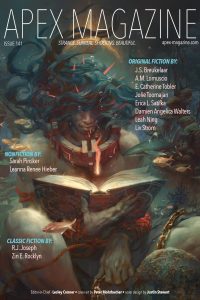Liz Bourke Reviews The Iron Princess by Barbara Hambly
 The Iron Princess, Barbara Hambly (Open Road Media 978-1-50408-132-0, $34.99, 360pp, hc; 978-1-50407-902-0, $18.99, 360pp, tp) February 2023. Cover by Amanda Shaffer.
The Iron Princess, Barbara Hambly (Open Road Media 978-1-50408-132-0, $34.99, 360pp, hc; 978-1-50407-902-0, $18.99, 360pp, tp) February 2023. Cover by Amanda Shaffer.
Barbara Hambly’s early career was defined by her fantasy novels, and for many readers in the 1980s – and indeed, a number of writers – books like The Ladies of Mandrigyn and Dragonsbane proved influential, even formative. But for the last decade and a half, she’s been far better known for her historical crime fiction, most notably the Benjamin January series, set in New Orleans in the first half of the 19th century. While she’s continued her historical vampire books (the James Asher series), it’s been quite some time since her last novel-length foray into the fields of a world entirely separate from our own: the traditional staple of so much fantasy literature. The Iron Princess is just such a fantasy, and it turns out that Hambly’s writing chops have only improved over the decades. I am so very happy that it exists, and that I get to read it.
Ithrazel the Cursed. A wizard who protested against the enslavement and exploitation of a whole people. A wizard who destroyed an entire city, guilty and innocent alike, in one bloody night. Exiled to another world by his enemies, chained to a mountaintop, eaten alive by day and regenerating by night, he’s spent decades in hopeless suffering.
And, unfortunately, he is Clea’s best chance to find out what kind of thing is emerging from the marshes and channels of the exploited Twilight Lands to wipe out villages; her best chance to understand why all magic but that of the Crystal Mages is failing. Her only option, in fact, to answer these questions without getting killed, for Clea stands in a dangerous liminal position: charismatic in her own right, the descendant of a respected leader in the Twilight Lands, and the once-repudiated, recently relegitimised daughter of the powerful Stylachos family, wealthiest and most powerful of the Twilight Lands’ colonisers, familiar with the underbelly of society because after her repudiation that’s where she grew to adulthood, she’s someone that very few of the powers that be really care to have around. Even before she started looking for answers to truly dangerous questions.
Hambly sets this novel in a society defined by exploitative colonialism, one that might well rival Leopold II’s Congo for grotesque atrocity and the functional enslavement of entire communities. The extractive economy of this society is based on a substance called adamis, dredged from the marshes and river basins of the Twilight Lands under the aegis of colonial ‘‘concessions.’’ Adamis, and its refined version, adamite, fuel the magic and ever-increasing influence of the Crystal Mages, who as an order also own many of the concessions. This is a vivid, atmospheric, deeply thought world, with layers of history: neither the people of the Twilight Lands nor their colonisers exist as a monolith, and thanks to Ithrazel’s perspective, we know that both societies haven’t spent the last seventy years static and unchanging. The changes might not be for the better, but the world Hambly offers us here is undeniably alive.
This brutally vivid, intensely layered setting joins itself with main characters whose fraught backstories are brought to light in glimpses, at times elliptically, so that they take shape, chapter by chapter, like a wood sculpture emerging under a craftsperson’s hand. The driving force of the plot begins as ‘‘explain the monster that ate a village, what’s going on and how can we stop it?’’ and develops in Hambly’s deft, skillful narrative – hint after implication, deduction after revelation – into ‘‘this corrupt and exploitative society is reaping the destructive ecological and magical fruits it has sown, and unfortunately the destruction will also extend to everyone exploited by it.’’ A brutally repressive, exploitative society is always one struck spark away from revolutionary (or retributionary) violence, and this, too, comes to a head as the narrative progresses.
Alongside this is the mystery of the problems with magic, and the political and economic influence and shady dealings of the unaffected order of Crystal Mages; Clea’s complicated feelings about, and even more complicated relationship with, her family (father, younger half-brother, older half-sister); the gap in Ithrazel’s memory around his moment of decision to destroy a whole city, and his jaded, bitter reluctance at being compelled to help. (He tried to make things better. Seventy years later, they’re so much worse and he’s also spent a long time being tortured.) He and Clea, along with the young sorceress Graywillow, Clea’s friend, and the shepherd who they accidentally collect along the way, make for an interesting quartet of companions: they rub up against each other, each a different lens on the world, illuminating in their contrasts.
Hambly isn’t holding back: this is a dense and rich reading experience, a powerful fantasy novel that does a great deal of its thematic work in atmosphere and implication. It’s difficult for this reviewer to do it justice.
One of the things that makes it difficult is its utter refusal of simple answers, in terms of its characters, its themes, its ethical worldview. Hambly has a historian’s eye for the world she’s created: wrongs may be obvious – particularly where they rise to the level of atrocity – but what should, or can, be done in response to them is much less often so easy to divine. To forgive nothing and burn the innocent along with the guilty causes as much suffering as failing to hold the wrongdoers to account. And what place does affection have in this, what place necessity, what place restitution? (For some things, is meaningful restitution even possible?) Clea’s experience in the Stylach as family and her feelings about her relations is a personal microcosm that mirrors wider currents in society. Hambly’s characters are an endearingly human combination of selfish and selfless, never wholly one or the other, and when human and inhuman disasters collide at The Iron Princess’s explosive climax, in the aftermath, a better (local) world is possible – but far from guaranteed.
It’s interesting to me that The Iron Princess uses many of the same elements of the ‘‘grimdark’’ turn in epic fantasy – Hambly doesn’t flinch from the brutality inherent in the extractive, colonialist premise, and neither of her main characters are particularly pure of heart or mind – while avoiding both the nihilist ethics and the bleak sensibilities that for me defined the ‘‘grimdark’’ vein. (I would say ‘‘rejecting,’’ but I doubt that Hambly’s in conversation with that particular set of generic topoi in this work, so much as responding to real history.)
There are moments when I thought The Iron Princess’s narrative wandered a little into the weeds, where it could have been tighter at the point of reading. In retrospect, though, I can see reasons that Hambly made the decisions she did, and if a little too much geographical wandering by the characters is the largest of my complaints, it’s a pretty small one.
If this is the last fantasy novel Hambly writes, I’ll grieve that we never get another. (Mystery novels are probably better-paying.) But The Iron Princess is a strikingly effective, thought-provoking, rich piece of work. It left me very satisfied as a reader. Go now and read it for yourself: I recommend it highly.
Liz Bourke is a cranky queer person who reads books. She holds a Ph.D in Classics from Trinity College, Dublin. Her first book, Sleeping With Monsters, a collection of reviews and criticism, is out now from Aqueduct Press. Find her at her blog, her Patreon, or Twitter. She supports the work of the Irish Refugee Council and the Abortion Rights Campaign.
This review and more like it in the May 2023 issue of Locus.
 While you are here, please take a moment to support Locus with a one-time or recurring donation. We rely on reader donations to keep the magazine and site going, and would like to keep the site paywall free, but WE NEED YOUR FINANCIAL SUPPORT to continue quality coverage of the science fiction and fantasy field.
While you are here, please take a moment to support Locus with a one-time or recurring donation. We rely on reader donations to keep the magazine and site going, and would like to keep the site paywall free, but WE NEED YOUR FINANCIAL SUPPORT to continue quality coverage of the science fiction and fantasy field.
©Locus Magazine. Copyrighted material may not be republished without permission of LSFF.








